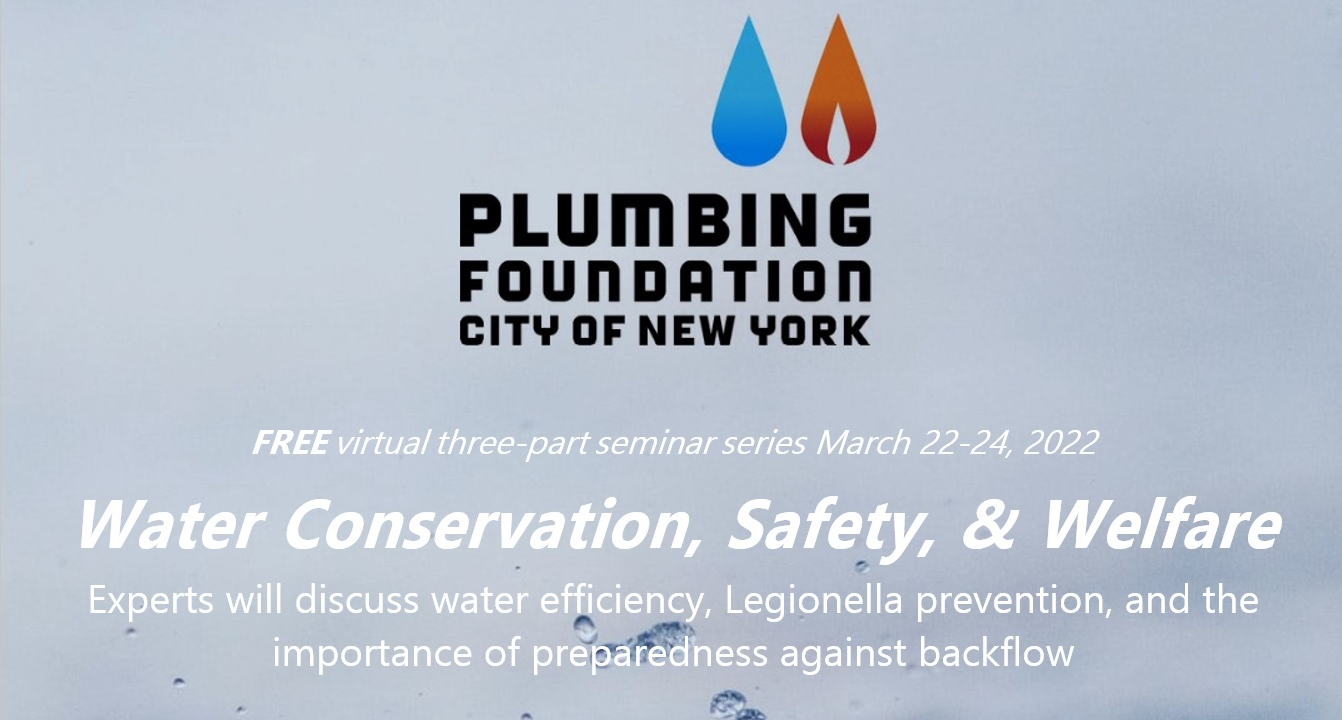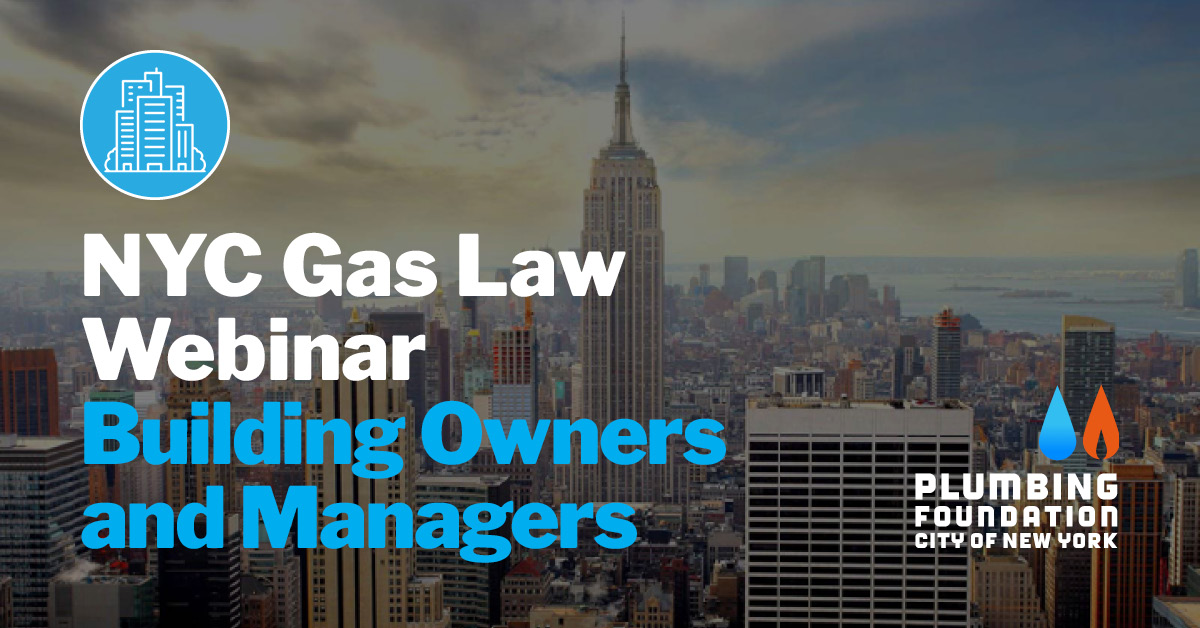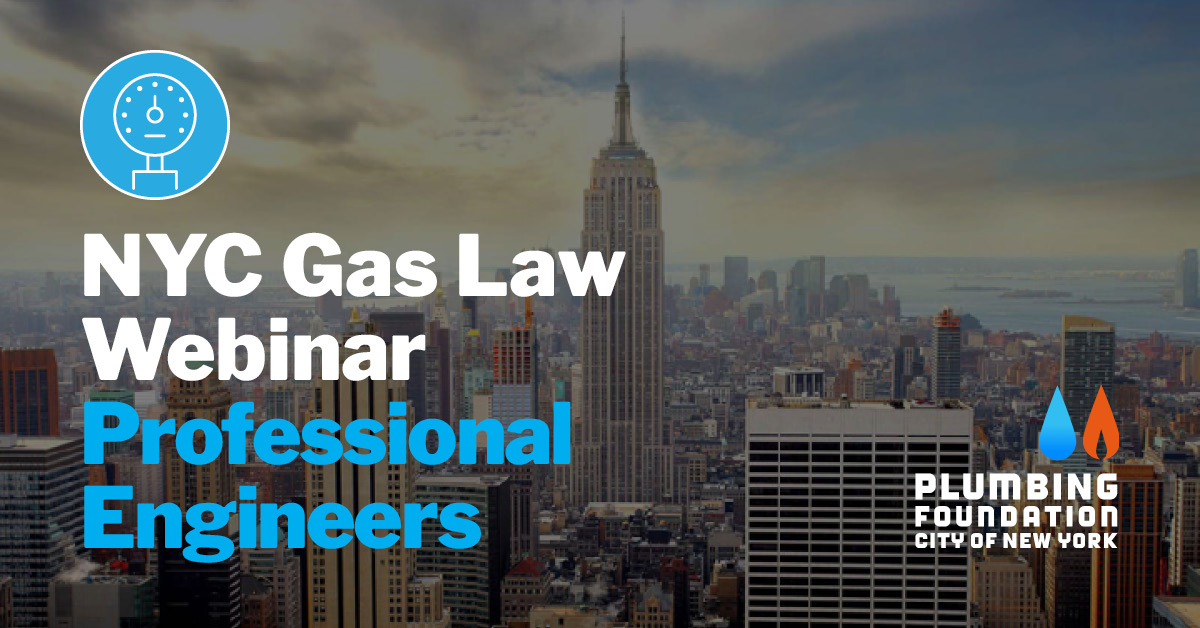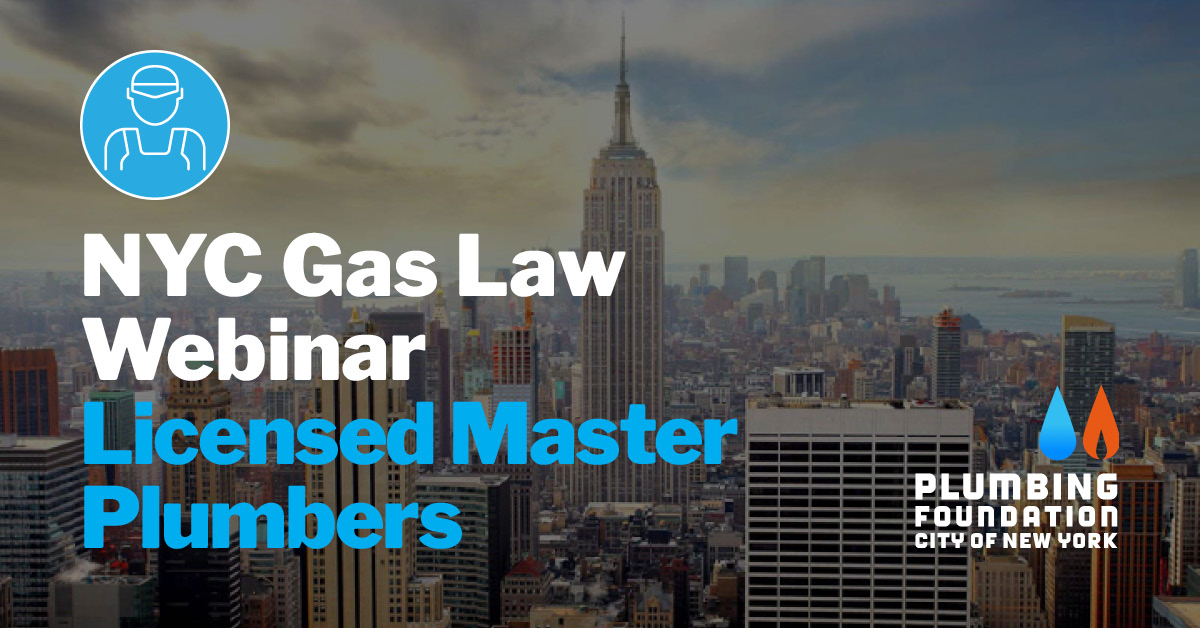What Happened to Congestion Pricing?
Water Conservation, Safety, and Welfare Series Held March 22-24
The Plumbing Foundation City of New York, Inc. hosted a three-part webinar series in which experts discussed water efficiency, Legionella prevention, and the importance of preparedness against backflow.
The recordings are no longer available, but if you are interested in the videos and/or materials presented, please email info@plumbingfoundation.nyc.
Part 1: Water Efficiency (originally recorded on March 22, 2022)Coinciding with World Water Day, this panel discussed water efficiency and sustainability methods, the role of the Licensed Master Plumber, and ways owners can work with their plumber to conserve water usage and increase sustainability. Our expert panelists included:
- Stephanie Tanner, CEM, LEED AP BD+C, Lead Engineer, WaterSense Program, U.S. Environmental Protection Agency
- Alan Cohn, Managing Director, Integrated Water Management, NYC Department of Environmental Protection
- John Brock, Policy Analyst, Integrated Water Management, NYC Department of Environmental Protection
- Peter Li, PE, LEED AP, Associate Partner, Jaros, Baum & Bolles
This panel discussed the Legionella problem and what more can and should be done in New York City to prevent and combat Legionnaires’ Disease. Our expert panelists included:
- Manhattan Borough President Mark Levine
- Dr. Janet Stout, President of Special Pathogens Laboratory
- John Letson, VP of Plant Operations at Memorial Sloan-Kettering
- Robert Greenberg, President, Evergreen Mechanical
This panel discussed the impact of recent mega storms on NYC homeowners, the Citywide Climate Adaptation Plan passed by the NYC Council last October, as well as the existing backflow prevention requirements and why it is vital to comply with installation and testing requirements. Our expert panelists include:
- NYS Senator Joseph Addabbo Jr.
- Muhammad Hossain, PhD, PE, Chief-Connections, BWSO, NYC Department of Environmental Protection and Adj. Professor at City University of New York
- Rob Greenberg, President, Evergreen Mechanical
- Ron Merhige, PE, CEM, President, RLM Engineering PLLC
Water Conservation, Safety & Welfare
 Please join the Plumbing Foundation for a FREE virtual three-part seminar series March 22-24, 2022!
The Water Conservation, Safety, & Welfare series will entail experts discussing water efficiency, Legionella prevention, and the importance of preparedness against backflow.
Please click on the applicable event to register!
Part 1: Water Efficiency – March 22, 2022 at 10-11am
Coinciding with World Water Day, a discussion on the role of the Licensed Master Plumber and ways owners can work with their plumber to conserve water usage and increase sustainability. Our expert panelists include:
Please join the Plumbing Foundation for a FREE virtual three-part seminar series March 22-24, 2022!
The Water Conservation, Safety, & Welfare series will entail experts discussing water efficiency, Legionella prevention, and the importance of preparedness against backflow.
Please click on the applicable event to register!
Part 1: Water Efficiency – March 22, 2022 at 10-11am
Coinciding with World Water Day, a discussion on the role of the Licensed Master Plumber and ways owners can work with their plumber to conserve water usage and increase sustainability. Our expert panelists include:
- Stephanie Tanner, CEM, LEED AP BD+C, Lead Engineer, WaterSense Program, U.S. Environmental Protection Agency
- Alan Cohn, Managing Director, Integrated Water Management, NYC Department of Environmental Protection
- John Brock, Policy Analyst, Integrated Water Management, NYC Department of Environmental Protection
- Peter Li, PE, LEED AP, Associate Partner, Jaros, Baum & Bolles
- Manhattan Borough President Mark Levine
- Dr. Janet Stout, President of Special Pathogens Laboratory
- John Letson, VP of Plant Operations at Memorial Sloan-Kettering
- Robert Greenberg, President, Evergreen Mechanical
- NYS Senator Joseph Addabbo Jr.
- Muhammad Hossain, PhD, PE, Chief-Connections, BWSO, NYC Department of Environmental Protection and Adj. Professor at City University of New York
- Rob Greenberg, President, Evergreen Mechanical
- Ron Merhige, PE, CEM, President, RLM Engineering PLLC
New Yorkers Should be Alarmed by City Council Introduction Bill Number 2317A
2021 Renewable Energy Forum: Role of Hydrogen
How NYC Gas Laws Impact Building Owners & Managers
 Seminar Recording:
https://zoom.us/rec/share/OykqO_3VZ3kycuPIYYObniqQrVZPU0O-726oTMR7FSEG0nH1ocMEiv89edoqpPI0.3dx_JDLBj2ffC3YY
Contact us for more information or if the link above has expired.
Seminar Recording:
https://zoom.us/rec/share/OykqO_3VZ3kycuPIYYObniqQrVZPU0O-726oTMR7FSEG0nH1ocMEiv89edoqpPI0.3dx_JDLBj2ffC3YY
Contact us for more information or if the link above has expired. How NYC Gas Laws Impact Professional Engineers
 Seminar Recording:
https://zoom.us/rec/share/JIQK__l9SMRjKmEUiZgYK7At64WHwDrsLfXZKcJKSiKr03pf4ll-url_E7Qv8GmC.XkrIoDyzhzIKeSFs
Contact us for more information or if the link above has expired.
Seminar Recording:
https://zoom.us/rec/share/JIQK__l9SMRjKmEUiZgYK7At64WHwDrsLfXZKcJKSiKr03pf4ll-url_E7Qv8GmC.XkrIoDyzhzIKeSFs
Contact us for more information or if the link above has expired. The Plumbing Foundation testifies in support of Intro No. 1576 at Committee on Environmental Protection Hearing
On Tuesday, February 16, 2021, Terence O’Brien, Senior Director of the Plumbing Foundation, testified virtually at the NYC Council Committee on Environmental Protection Hearing in support of Intro. No. 1576, which proposes to increase the penalties imposed on owners failing to comply with the mandatory installation of and reporting requirements for backflow prevention devices.
“Backflow” occurs when drinking water is contaminated by hazardous substances. It happens when street pressure pushes water into buildings where dangerous materials and chemicals may exist, and no device prevents that now contaminated water from re-entering the drinking water supply. Sometimes water flow can be reversed due to a water main break or a mistaken or accidental cross connection between the building’s water distribution and drainage systems. Therefore, it is vital that buildings install and maintain backflow prevention devices to prevent the harmful results of contaminated water, which can contain bacteria like E. coli and Salmonella.
Senior Director O’Brien urged the passage of Intro. No. 1576 to properly incentivize compliance with the law. The NYC Administrative Code currently allows first-time fines to be imposed anywhere from $50–$1,000 for violation of the requirement to install a backflow device. Such fines do not provide enough of an incentive for owners to comply with the law. In a former Council hearing, the NYC Department of Environmental Protection (DEP) clarified that the Department fines building owners $500-$5,000.* In contrast, a backflow device itself can cost up to $20,000. This is why the industry believes fines should be increased, so that owners do not continue merely paying the lower fine but rather comply with the law and actually install the required devices.
O’Brien testified that Intro. No. 1576 addresses the problem as outlined above. It would increase the monetary penalties to be imposed on a building owner or operator who fails to comply with installation and reporting requirements for backflow prevention devices.
The installation of backflow prevention devices is a public health priority. It is apparent that the understanding of and compliance with backflow prevention is still an issue at large in the City. Steep fines must be imposed on owners who fail to comply with the law in order to property incentivize compliance.
*Hearing on Intro. No. 821, Committee on Environmental Protection, The New York City Council (Oct. 30, 2017).
How NYC Gas Laws Impact Licensed Plumbers
Plumbers: How NYC Gas Laws Impact You
Seminar date: Feb 11, 2021 Seminar Recording:
https://zoom.us/rec/share/Np9XJC7_f3spor27LQlR9v9XeJy49Phgfi8pvQwlXyeRzmIgodbqS5OE-r8goUgk.OMOyjExHhpj73eJX
Contact us for more information or if the link above has expired.
Seminar Recording:
https://zoom.us/rec/share/Np9XJC7_f3spor27LQlR9v9XeJy49Phgfi8pvQwlXyeRzmIgodbqS5OE-r8goUgk.OMOyjExHhpj73eJX
Contact us for more information or if the link above has expired.